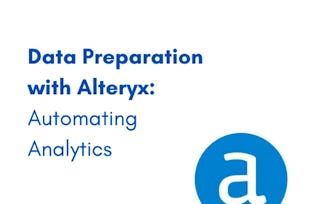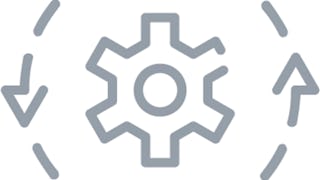Dies ist der dritte Kurs des Google Data Analytics Zertifikats. Während Sie Ihr Verständnis der Themen aus den ersten beiden Kursen weiter ausbauen, werden Sie in neue Themen eingeführt, die Ihnen helfen, praktische Data Analytics Fähigkeiten zu erwerben. Sie werden lernen, wie Sie Tools wie Tabellen und SQL verwenden, um die richtigen Daten für Ihre Ziele zu extrahieren und zu nutzen, und wie Sie Ihre Daten organisieren und schützen können. Aktuelle Datenanalysten von Google werden Sie weiter unterrichten und Ihnen praktische Möglichkeiten aufzeigen, wie Sie gängige Aufgaben eines Datenanalysten mit den besten Tools und Ressourcen bewältigen können. Lernende, die dieses Zertifikatsprogramm abschließen, werden in der Lage sein, sich auf Einstiegsjobs als Datenanalysten zu bewerben. Am Ende dieses Kurses werden die Teilnehmer: - herausfinden, wie Analysten entscheiden, welche Daten für die Analyse gesammelt werden sollen - strukturierte und unstrukturierte Daten, Datentypen und Datenformate kennenlernen - entdecken, wie man verschiedene Arten von Voreingenommenheit in Daten erkennt, um die Glaubwürdigkeit von Daten zu gewährleisten.

Daten zur Exploration aufbereiten

Daten zur Exploration aufbereiten
Dieser Kurs ist Teil von Google-Datenanalyse (berufsbezogenes Zertifikat)
Unterrichtet in Deutsch (KI-Synchronisation)

Dozent: Google Career Certificates
1.065.582 bereits angemeldet
Bei enthalten
23,063 reviews
Empfohlene Erfahrung
Was Sie lernen werden
Erläutern Sie, welche Faktoren bei Entscheidungen über die Datenerfassung zu berücksichtigen sind.
Diskutieren Sie den Unterschied zwischen verzerrten und unverzerrten Daten.
Beschreiben Sie Datenbanken mit Hinweisen auf ihre Funktionen und Komponenten.
Beschreiben Sie die besten Methoden zur Organisation von Daten.
Kompetenzen, die Sie erwerben
- Kategorie: Datensicherheit
- Kategorie: Datenkompetenz
- Kategorie: Erhebung von Daten
- Kategorie: Datenbanken
- Kategorie: Daten importieren/exportieren
- Kategorie: Datenspeicherung
- Kategorie: SQL
- Kategorie: Verwaltung von Metadaten
- Kategorie: Datenanalyse
- Kategorie: Datenmanagement
- Kategorie: Datenethik
- Kategorie: Google Sheets
- Kategorie: Unstrukturierte Daten
- Kategorie: Datenqualität
Wichtige Details

Zu Ihrem LinkedIn-Profil hinzufügen
29 Aufgaben
Erfahren Sie, wie Mitarbeiter führender Unternehmen gefragte Kompetenzen erwerben.

Erweitern Sie Ihr Fachwissen im Bereich Datenanalyse
- Lernen Sie neue Konzepte von Branchenexperten
- Gewinnen Sie ein Grundverständnis bestimmter Themen oder Tools
- Erwerben Sie berufsrelevante Kompetenzen durch praktische Projekte
- Erwerben Sie ein Berufszertifikat von Google zur Vorlage

In diesem Kurs gibt es 5 Module
Jeden Tag wird eine riesige Menge an Daten erzeugt. In diesem Teil des Kurses erfahren Sie, wie diese Daten erzeugt werden und wie Analysten entscheiden, welche Daten sie für die Analyse verwenden. Sie werden auch etwas über strukturierte und unstrukturierte Daten, Datentypen und Datenformate erfahren, während Sie darüber nachdenken, wie Sie Ihre Daten für die Analyse vorbereiten können.
Das ist alles enthalten
9 Videos10 Lektüren6 Aufgaben1 Plug-in
Bevor Sie mit Daten arbeiten, müssen Sie sicherstellen, dass diese unvoreingenommen und glaubwürdig sind. Denn wenn Sie Ihre Analyse mit unzuverlässigen Daten beginnen, werden Sie Ihren Ergebnissen nicht trauen können. In diesem Teil des Kurses werden Sie lernen, Voreingenommenheit in Daten zu erkennen und sicherzustellen, dass Ihre Daten glaubwürdig sind. Sie werden sich auch mit Open Data und der Bedeutung von Datenethik und Datenschutz befassen.
Das ist alles enthalten
12 Videos4 Lektüren6 Aufgaben
Wenn Sie große Datasets analysieren, werden Sie auf viele der Daten aus einer Datenbank zugreifen. In diesem Teil des Kurses lernen Sie etwas über Datenbanken und wie Sie auf sie zugreifen und die darin enthaltenen Daten extrahieren, filtern und sortieren können. Sie werden sich auch mit Metadaten befassen, um ihre vielen Facetten zu entdecken und zu erfahren, wie Analysten sie nutzen, um ihre Daten besser zu verstehen.
Das ist alles enthalten
10 Videos13 Lektüren12 Aufgaben
Gute organisatorische Fähigkeiten sind ein wichtiger Bestandteil der meisten Arbeiten, insbesondere der Data Analytics. In diesem Teil des Kurses lernen Sie die besten Methoden kennen, um Daten zu organisieren und sicher zu halten. Sie werden auch verstehen, wie Analysten Namenskonventionen für Dateien verwenden, um ihre Arbeit zu organisieren.
Das ist alles enthalten
3 Videos3 Lektüren4 Aufgaben1 Plug-in
Eine starke Online-Präsenz kann für Arbeitssuchende aller Art eine große Hilfe sein. In diesem Teil des Kurses erfahren Sie, wie Sie Ihre Online-Präsenz verwalten können. Außerdem erfahren Sie, welchen Nutzen die Vernetzung mit anderen Data Analytics-Experten hat.
Das ist alles enthalten
2 Videos4 Lektüren1 Aufgabe
Erwerben Sie ein Karrierezertifikat.
Fügen Sie dieses Zeugnis Ihrem LinkedIn-Profil, Lebenslauf oder CV hinzu. Teilen Sie sie in Social Media und in Ihrer Leistungsbeurteilung.
Dozent

von
Mehr von Datenanalyse entdecken
 Status: Kostenloser Testzeitraum
Status: Kostenloser Testzeitraum Status: Kostenlos
Status: Kostenlos Status: Kostenloser Testzeitraum
Status: Kostenloser Testzeitraum Status: Kostenloser Testzeitraum
Status: Kostenloser Testzeitraum
Warum entscheiden sich Menschen für Coursera für ihre Karriere?

Felipe M.

Jennifer J.

Larry W.

Chaitanya A.
Bewertungen von Lernenden
- 5 stars
81,98 %
- 4 stars
14,69 %
- 3 stars
2,37 %
- 2 stars
0,47 %
- 1 star
0,47 %
Zeigt 3 von 23063 an
Geprüft am 8. Aug. 2023
I love how the course it's not limited to teach about the technical skills of a data analyst professional, but it also helps you discover some soft skills that make you a better human resource.
Geprüft am 15. Nov. 2023
As a beginner, I really appreciated the ease and pace of the course. The videos were explanatory, the reads weren't over-whelming, and the hands-0n activities were very easy to follow and comprehend.
Geprüft am 8. Aug. 2021
As a beginner in SQL and Data analyst world, this course "Prepare Data for exploration" open my eyes and enrich my knowledge. I do really enjoy this course. and Excited to move forward. Thank you :)

Neue Karrieremöglichkeiten mit Coursera Plus
Unbegrenzter Zugang zu 10,000+ Weltklasse-Kursen, praktischen Projekten und berufsqualifizierenden Zertifikatsprogrammen - alles in Ihrem Abonnement enthalten
Bringen Sie Ihre Karriere mit einem Online-Abschluss voran.
Erwerben Sie einen Abschluss von erstklassigen Universitäten – 100 % online
Schließen Sie sich mehr als 3.400 Unternehmen in aller Welt an, die sich für Coursera for Business entschieden haben.
Schulen Sie Ihre Mitarbeiter*innen, um sich in der digitalen Wirtschaft zu behaupten.
Häufig gestellte Fragen
Daten sind eine Gruppe von Fakten, die viele verschiedene Formen annehmen können, z. B. Zahlen, Bilder, Wörter, Videos, Beobachtungen und mehr. Wir nutzen und erzeugen täglich Daten, z.B. wenn wir eine Sendung oder einen Song streamen oder in Social Media posten.
Data Analytics ist die Sammlung, Umwandlung und Organisation dieser Fakten, um Schlussfolgerungen zu ziehen, Vorhersagen zu treffen und fundierte Entscheidungen zu treffen.
Die Menge an Daten, die jeden Tag erzeugt wird, ist enorm. Jedes Mal, wenn Sie Ihr Telefon benutzen, etwas im Internet nachschlagen, Musik streamen, mit einer Kreditkarte einkaufen, auf Social Media posten oder mit GPS eine Route berechnen, erzeugen Sie Daten. Unternehmen müssen ihre Produkte, Dienstleistungen, Tools und Geschäftsstrategien ständig anpassen, um der Verbrauchernachfrage gerecht zu werden und auf neue Trends zu reagieren. Aus diesem Grund sind Fachkräfte für Datenanalyse sehr gefragt und werden gut bezahlt.
Fachkräfte für Datenanalyse machen aus Daten und Zahlen Sinn, um Unternehmen dabei zu helfen, bessere Geschäftsentscheidungen zu treffen. Sie bereiten Daten auf, verarbeiten sie, analysieren sie und visualisieren sie. Dabei entdecken sie Muster und Trends und beantworten wichtige Fragen. Ihre Arbeit ermöglicht es dem gesamten Team, bessere Geschäftsentscheidungen zu treffen.
Im Google Data Analytics-Zertifikat erlernen Sie die Fähigkeiten, die Sie als Junior oder Associate Datenanalyst benötigen. Fachkräfte für Datenanalyse wissen, wie man die richtige Frage stellt, Daten aufbereitet, verarbeitet und analysiert, um wichtige Statistiken zu erhalten, ihre Ergebnisse effektiv mit Stakeholdern teilt und datengestützte Empfehlungen für durchdachte Maßnahmen gibt.
In unserem Programm erlernen Sie diese berufsrelevanten Fähigkeiten durch interaktive Inhalte (Diskussionsaufforderungen, Quiz und Aktivitäten) in weniger als sechs Monaten und mit weniger als 10 Stunden flexiblem Lernen pro Woche. Dabei arbeiten Sie sich durch einen Lehrplan, der mit Anregungen von Top-Arbeitgebern und Branchenführern wie Tableau, Accenture und Deloitte entwickelt wurde. Sie werden sogar die Möglichkeit haben, eine Fallstudie zu erstellen, die Sie potenziellen Arbeitgebern vorlegen können, um Ihre neuen Fähigkeiten zu präsentieren.
Nach Abschluss des Programms haben Sie Zugang zu Karriereressourcen und werden direkt mit Arbeitgebern in Verbindung gebracht, die offene Einstiegspositionen im Bereich Data Analytics anbieten.
Weitere Fragen
Finanzielle Unterstützung verfügbar,

